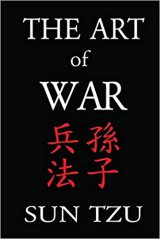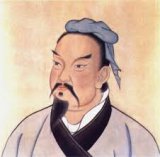The Art of War Page #6
The Art of War is an ancient Chinese military treatise dating from the Late Spring and Autumn Period. The work, which is attributed to the ancient Chinese military strategist Sun Tzu, is composed of 13 chapters. Each one is devoted to an aspect of warfare and how it applies to military strategy and tactics.
31. If the enemy sees an advantage to be gained and makes no effort to secure it, the soldiers are exhausted. 32. If birds gather on any spot, it is unoccupied. Clamor by night betokens nervousness. 33. If there is disturbance in the camp, the general's authority is weak. If the banners and flags are shifted about, sedition is afoot. If the officers are angry, it means that the men are weary. 34. When an army feeds its horses with grain and kills its cattle for food, and when the men do not hang their cooking-pots over the camp-fires, showing that they will not return to their tents, you may know that they are determined to fight to the death. 35. The sight of men whispering together in small knots or speaking in subdued tones points to disaffection amongst the rank and file. 36. Too frequent rewards signify that the enemy is at the end of his resources; too many punishments betray a condition of dire distress. 37. To begin by bluster, but afterwards to take fright at the enemy's numbers, shows a supreme lack of intelligence. 38. When envoys are sent with compliments in their mouths, it is a sign that the enemy wishes for a truce. 39. If the enemy's troops march up angrily and remain facing ours for a long time without either joining battle or taking themselves off again, the situation is one that demands great vigilance and circumspection. 40. If our troops are no more in number than the enemy, that is amply sufficient; it only means that no direct attack can be made. What we can do is simply to concentrate all our available strength, keep a close watch on the enemy, and obtain reinforcements. 41. He who exercises no forethought but makes light of his opponents is sure to be captured by them. 42. If soldiers are punished before they have grown attached to you, they will not prove submissive; and, unless submissive, then will be practically useless. If, when the soldiers have become attached to you, punishments are not enforced, they will still be unless. 43. Therefore soldiers must be treated in the first instance with humanity, but kept under control by means of iron discipline. This is a certain road to victory. 44. If in training soldiers commands are habitually enforced, the army will be well-disciplined; if not, its discipline will be bad. 45. If a general shows confidence in his men but always insists on his orders being obeyed, the gain will be mutual. X. Terrain 1. Sun Tzu said: We may distinguish six kinds of terrain, to wit: (1) Accessible ground; (2) entangling ground; (3) temporizing ground; (4) narrow passes; (5) precipitous heights; (6) positions at a great distance from the enemy. 2. Ground which can be freely traversed by both sides is called accessible. 3. With regard to ground of this nature, be before the enemy in occupying the raised and sunny spots, and carefully guard your line of supplies. Then you will be able to fight with advantage. 4. Ground which can be abandoned but is hard to re-occupy is called entangling. 5. From a position of this sort, if the enemy is unprepared, you may sally forth and defeat him. But if the enemy is prepared for your coming, and you fail to defeat him, then, return being impossible, disaster will ensue. 6. When the position is such that neither side will gain by making the first move, it is called temporizing ground. 7. In a position of this sort, even though the enemy should offer us an attractive bait, it will be advisable not to stir forth, but rather to retreat, thus enticing the enemy in his turn; then, when part of his army has come out, we may deliver our attack with advantage. 8. With regard to narrow passes, if you can occupy them first, let them be strongly garrisoned and await the advent of the enemy. 9. Should the army forestall you in occupying a pass, do not go after him if the pass is fully garrisoned, but only if it is weakly garrisoned. 10. With regard to precipitous heights, if you are beforehand with your adversary, you should occupy the raised and sunny spots, and there wait for him to come up. 11. If the enemy has occupied them before you, do not follow him, but retreat and try to entice him away. 12. If you are situated at a great distance from the enemy, and the strength of the two armies is equal, it is not easy to provoke a battle, and fighting will be to your disadvantage. 13. These six are the principles connected with Earth. The general who has attained a responsible post must be careful to study them. 14. Now an army is exposed to six several calamities, not arising from natural causes, but from faults for which the general is responsible. These are: (1) Flight; (2) insubordination; (3) collapse; (4) ruin; (5) disorganization; (6) rout. 15. Other conditions being equal, if one force is hurled against another ten times its size, the result will be the flight of the former. 16. When the common soldiers are too strong and their officers too weak, the result is insubordination. When the officers are too strong and the common soldiers too weak, the result is collapse. 17. When the higher officers are angry and insubordinate, and on meeting the enemy give battle on their own account from a feeling of resentment, before the commander-in-chief can tell whether or no he is in a position to fight, the result is ruin. 18. When the general is weak and without authority; when his orders are not clear and distinct; when there are no fixes duties assigned to officers and men, and the ranks are formed in a slovenly haphazard manner, the result is utter disorganization. 19. When a general, unable to estimate the enemy's strength, allows an inferior force to engage a larger one, or hurls a weak detachment against a powerful one, and neglects to place picked soldiers in the front rank, the result must be rout. 20. These are six ways of courting defeat, which must be carefully noted by the general who has attained a responsible post. 21. The natural formation of the country is the soldier's best ally; but a power of estimating the adversary, of controlling the forces of victory, and of shrewdly calculating difficulties, dangers and distances, constitutes the test of a great general. 22. He who knows these things, and in fighting puts his knowledge into practice, will win his battles. He who knows them not, nor practices them, will surely be defeated. 23. If fighting is sure to result in victory, then you must fight, even though the ruler forbid it; if fighting will not result in victory, then you must not fight even at the ruler's bidding. 24. The general who advances without coveting fame and retreats without fearing disgrace, whose only thought is to protect his country and do good service for his sovereign, is the jewel of the kingdom. 25. Regard your soldiers as your children, and they will follow you into the deepest valleys; look upon them as your own beloved sons, and they will stand by you even unto death.
Translation
Translate and read this book in other languages:
Select another language:
- - Select -
- 简体中文 (Chinese - Simplified)
- 繁體中文 (Chinese - Traditional)
- Español (Spanish)
- Esperanto (Esperanto)
- 日本語 (Japanese)
- Português (Portuguese)
- Deutsch (German)
- العربية (Arabic)
- Français (French)
- Русский (Russian)
- ಕನ್ನಡ (Kannada)
- 한국어 (Korean)
- עברית (Hebrew)
- Gaeilge (Irish)
- Українська (Ukrainian)
- اردو (Urdu)
- Magyar (Hungarian)
- मानक हिन्दी (Hindi)
- Indonesia (Indonesian)
- Italiano (Italian)
- தமிழ் (Tamil)
- Türkçe (Turkish)
- తెలుగు (Telugu)
- ภาษาไทย (Thai)
- Tiếng Việt (Vietnamese)
- Čeština (Czech)
- Polski (Polish)
- Bahasa Indonesia (Indonesian)
- Românește (Romanian)
- Nederlands (Dutch)
- Ελληνικά (Greek)
- Latinum (Latin)
- Svenska (Swedish)
- Dansk (Danish)
- Suomi (Finnish)
- فارسی (Persian)
- ייִדיש (Yiddish)
- հայերեն (Armenian)
- Norsk (Norwegian)
- English (English)
Citation
Use the citation below to add this book to your bibliography:
Style:MLAChicagoAPA
"The Art of War Books." Literature.com. STANDS4 LLC, 2024. Web. 22 Dec. 2024. <https://www.literature.com/book/the_art_of_war_1016>.




Discuss this The Art of War book with the community:
Report Comment
We're doing our best to make sure our content is useful, accurate and safe.
If by any chance you spot an inappropriate comment while navigating through our website please use this form to let us know, and we'll take care of it shortly.
Attachment
You need to be logged in to favorite.
Log In